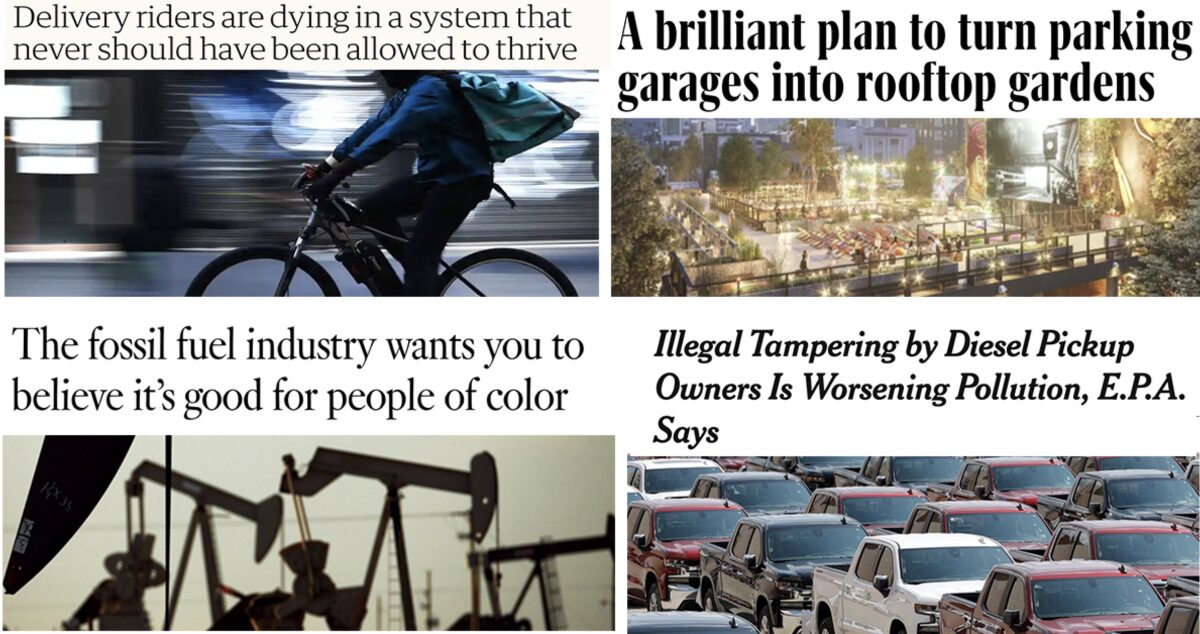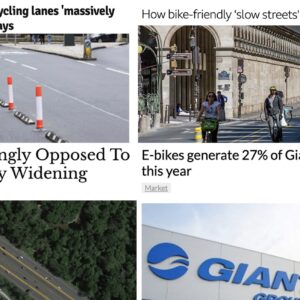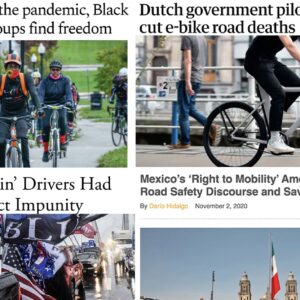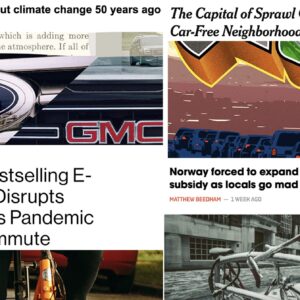Welcome to the week.
Before we get to our recap of the most notable items from the past seven days, don’t forget that The eBike Store’s Black Friday Sale runs through Friday December 4th. Roll over to their Covid-safe shop across from Peninsula Park and tell them BikePortland sent you.
And away we go…
Karencentives: Hoping to increase safety around bike lanes (among other things) a bill from New York City council would increase fines for illegal parking and give 25% of the fee to the person who reported it!
Concern trolling: Big Oil and their enablers want you to think your anti-fossil fuel advocacy hurts Black people and other people of color.
Slow e-bikes: It’s absurd to cap the speed of e-bikes at 15 mph while we let car drivers run amok, yet that’s what the Divvy bike share system in Chicago is doing. Divvy is operated by Lyft, the same company behind Biketown. Portland’s bikes can can still go up to 20 mph.
Advertisement
E-bike revolution, part 637: Seems like every week there’s another article about the e-bike popularity boom. This one has a local flavor as it comes from The Columbian and is based on riders from Bend.
Wasted space no longer: A neat idea in Sydney would allow developers to get transferable density credits if they turn parking lots into rooftop playgrounds, gardens, or other uses that have a strong public benefit.
Truck culture is a death cult: Not satisfied with the inherently deadly dangers posed by their obscene grill heights and lack of visibility, the EPA found an estimated 500,000 truck owners have outfitted their vehicles with illegal devices that increase toxic diesel emissions that can lead to heart and lung disease and premature death. Petro-masculinity at its worst. Ugh.
Advertisement
The truth heals: “It took a pandemic, but New York City is seeing more clearly than ever that its roadways can do more than move cars and trucks,” says this NY Times opinion piece. Same can be said for Portland and our elected leaders should seize the opportunity for change.
Tragic deliveries: A rash of fatal crashes involving bicycle delivery riders in Australia’s largest city has a labor leader questioning their working conditions.
Transit FTW: Transit Center says the recent elections were great for transit funding and a sign that the transportation mode is a political winner.
ODOT’s games: This letter published by The Oregonian about ODOT’s I-5 Rose Quarter project asks the $800 million question: “Will somebody please explain why this is a good idea again?”
— Jonathan Maus: (503) 706-8804, @jonathan_maus on Twitter and jonathan@bikeportland.org
— Get our headlines delivered to your inbox.
— Support this independent community media outlet with a one-time contribution or monthly subscription.








Thanks for reading.
BikePortland has served this community with independent community journalism since 2005. We rely on subscriptions from readers like you to survive. Your financial support is vital in keeping this valuable resource alive and well.
Please subscribe today to strengthen and expand our work.
The Rose Quarter suffers from the same problems the SW Corridor did/does. These planners and managers want to work on big projects that will allow them to climb the ladder at their own agencies or move to other agencies in a higher position. These projects don’t make sense but these agencies refuse to drop them because they’ve invested so much of their career into pushing them.
What looks better on a resume, finishing a project that doesn’t really have a use or spending years studying and preparing for a project and then not finishing it?
I realize that from the point of view of society, an incomplete or not-yet-finished project looks like a vast waste of time and resources. But for those working in the trenches, such projects provide plenty of opportunities for completed smaller projects and promotions. No large project is ever treated as such – it’s usually broken up into numerous (sometimes hundreds or even thousands) of tasks and smaller projects, all of which have a beginning, a middle, and an end. Take the CRC – at least $110 million was spent on various studies, plans, surveys, public meetings, engineering drawings, NEPA reports, etc etc. Many people were hired, teams were formed, people got paid and promoted, many small tasks were completed, small firms made money (and some large ones too), and everyone was happy except the tax payers, Portland activists, and apparently the Republicans in the Washington State Legislature who eventually killed it.
The LA Times article on Big Oil is hilarious! The author focuses on the evil oil companies (and who doesn’t hate Big Oil?), but it carefully avoids overtly criticizing state, county, and local governments in working with Big Oil on the related racism of their energy taxation policies – it only mentions them in passing. Who gets taxed for using energy? Well, pretty much all of us, but people who have solar or wind supplies and are “off the grid” tend to be wealthy and white. States also tax cigarette smokers, marijuana users, and gambling addicts (lotteries), who are disproportionately poor and BIPOC. Does the LA Times investigate this? Of course not.
Everyone needs a scapegoat.
Big trucks are getting out of hand. All of this is related to vehicle GVWR. Over 8500lbs and you’re “Heavy Duty” and exempt. So all the F250/2500 pickups, E250/Transit/Sprinter and bigger vehicles are in this category. It used to mean “work vehicles” but has since transformed into “commuter vehicles” and such. The diesel vehicle thing is silly here in Oregon. If your vehicle’s GVWR is over 8500lbs, you just sign a little form stating that and go on your way. I used to do this for my 7.3 diesel powered E350. They just mail you your renewal stickers. Similar deal with a E350 gas powered motorhome. It’s GVWR was over 8500lbs, so it didn’t matter that the check engine light was on when I drove to DEQ. We need to change the way exemptions are, maybe link it to a commercial vehicle type plate? If it’s harder to get a silly big diesel grocery getter truck, then less people will mess with their emissions. All I know is that the vehicles keep getting bigger, but the people and roads haven’t changed much.
I’m not against banning them (as some people have suggested in the past), but I would like to see an additional level of licensing for them to add a barrier to entry.
I’ve been making that argument for years: those who drive vehicles so big and heavy they are except from passenger-vehicle safety, emissions and CAFE standards should be held to a higher standard, because of the danger they pose to others.
If you can drive a Prius you can drive any 1 ton 3/4 ton pickup. they are that easy to drive. Millions of people drive them on a daily basis without killing or hitting anyone. Many of them used to tow small and large trailers, boats and various other things. and for your information most 3/4 and 1 ton pickups weigh less than 8000 lbs. The current weight requirement for a CDL is 27500.
Just going to point out that Gross Vehicle Weight Rating includes all passengers, payload, and a full tank of fuel.
Part of the problem is that now these huge trucks ARE easy to drive, and that has masked how big and potentially dangerous they are. No longer do you need to manually shift or deal with poor steering, weak brakes, slow acceleration, and swaying suspension. There’s less need to anticipate braking/stops, slowing down for turns, etc. So people drive them fast, and often carelessly. But, they are still large, heavy, dangerous vehicles. Yes, they are safer now for the people INSIDE than they ever were. But everyone outside is at increased risk. It’s an arms race of ever-bigger vehicles on the road. What vehicle do you want to run a stop sign and hit you on a bike or in your car? I’d take a commuter in their Prius over a commuter in their pickup.
There’s also a difference between curb weight and GVWR. GVWR is the max weight the vehicle can handle, including passenger(s) and cargo load. GVWR is the metric most often used to determine “Heavy Duty” (emissions reduced/exempt) status. Similar thing for Class A/B/C CDL. Though, that often adds in GCWR, which is the weight of your vehicle, plus the weight of what you’re towing. That CDL threshold is 26001lbs.
Either tax em by weight, require a CDL to buy or drive one, or legalize the vandalism and theft of the ones that pose the greatest hazard to.other road users. You should pay heavy dues to commute in something that could behead a Camry driver. The biggest trucks are road terrorism.
Anything over 6,000lbs should require a higher level of licensing, and additional DEQ testing. Although, many get around the DEQ requirements by registering them in counties that don’t have DEQ testing…
Even if your diesel isn’t heavy enough to meet the GVWR threshold most of these chip kits are easy enough to disable for a day so you can pass the test, then just put it back on and back to polluting. In order to catch them they would need to do spot checks or possibly require having something plugged into the truck at all times that would monitor the system for deviations.
Portland could solve its revenue problems with a Karencentives parking bounty system like the one being considered in NY. The revenue for a redo of the metro transportation measure could probably be raised from the fines on all the scofflaws who park on the wrong side of the street alone , plus we might be able to solve the houseless problem with a program to give economically disadvantaged folks a leg up in the reporting bounty system. If we added in an extra bounty for reporting Illegal modification of diesel pickups we would truly be on our way to a better world.
But the fines have to be structured in a way that minority populations don’t pay them.
There is probably some downside somewhere to paying residents to narc on one another, monetizing petty squabbles, and giving folks the tools to harass people they don’t like if their parking job isn’t quite up to snuff. But for the life of me I can’t imagine what it is.
We could then create a derivatives market of bribes to not snitch or to look the other way. There would also be opportunities to sabotage Prius owners and other do-gooder snobs with bad emissions, liable to arrest by the emission police or being snitched out by the parking Stazi. I can also easily imagine scammers praying on minorities and the elderly with the threat of such programs, plus the mafia getting involved in selling fake emission reports. Given all the data breaches lately, how might society treat known snitches when the names get published? Will we have to pay for snitch re-location and protection programs where names and identities are changed?
I could make a living off this just reporting every car I see parked facing the wrong way.
Grubhub, etc:
–they screw their workers with the contractor dodge
–they screw the restaurants (fees eat up any profit)
–they don’t even make money: https://www.bloomberg.com/opinion/articles/2019-10-31/food-delivery-is-a-dead-end-for-grubhub-doordash-and-postmates
What a mess.
E-bikes: “The biggest barrier is the cost; that is what people are surprised by,” Mendez said.
That is because people have been conditioned to expect regular bicycles to cost $300. Actual regular bicycles which you can expect to use on a daily basis cost far more than this new, they easily cost more than $1,000. So an e-bike that costs $3,000 should come as no surprise to anyone. Still, e-bike prices continue to come down as volumes increase, components get standardized and battery costs continue to drop. Plus, you will start seeing more of them on the used market for far lower prices.
Hey, even Harley-Davidson is getting in on the act. I would find it supremely funny if e-bikes save HD.
It’s so strange to me that people will buy $50,000 trucks and then spend what amounts to maybe a few tanks of gas for their bicycle.
Perhaps E-bike dealers need to start offering 0% APR for a 5 year term?
Bigger bike brands like Trek and Specialized already have their own credit cards so they can offer financing (this predates the appearance of e-bikes).
Most shops have a method to extend “6mo same as cash” credit. When I bought my e-bike a year ago, I took advantage of this.
When I reached out to the western tribes they never returned my phone calls. I’m nto surprised these groups are gaslighting around equity. Similarly, the Oregon League of Conservation Voters are engaging in a campaign of gaslighting on the elections score cards. What was the one issue they based all their endorsements on? Whether they voted for Cap and Trade or not. Same goes for 1000 friends of Oregon.
None of them have put forward a transportation program that actually reduces GHG emissions. Well guess who lost her bid for Senate Majority pro tempe? Ginny Birdick. The same democratic Senator who insisted on shutting down the entire state capitol for two sessions to pass what amounts to a bloated program that didn’t address the transport side of the equation…..I hope we don’t get hung out again on the Cap and Trade. State legislature should handle emissions regulations separately for Transport and Forestry. OLCV needs to check their egos on the capitol steps.
RE Defeat Devices: The article was vague about motivation, stating that owners are installing the device to “increase performance”. I’ve read elsewhere that this generally (but not exclusively) means getting better mileage (which makes sense given the wide range of altered vehicles cited in the article). So, Diesel Brothers aside, this mostly seems to be driven by economics rather than “petro masculinity”.
That doesn’t justify installing a defeat device, but properly diagnosing the problem is probably an important step on the road to figuring out how to fix it.
Any performance engine management system that increases emissions to get more horsepower has an economy mode setting that passes emissions and gives you better mileage. Sometimes a vehicle can be faster and more fuel efficient at the same time, it really depends on how the EMS is programmed. It’s up to the owner to decide when they want to use what mode and hopefully they are responsible and aren’t trying to spend more money than they have to on fuel, or stoplight drag racing all the time. I don’t like the idea of regulating “hot rodding” out of existence. It’s something people enjoy, and I bet as a cyclist you don’t like when anyone tries to regulate your joy out of existence.
There’s also truck owners who want to “roll coal” who install a device that tricks the oxygen sensor into dumping excess amounts of fuel, and this does not increase performance it just makes a giant cloud of black smoke. This should 100% be illegal because all it does is increase pollution. As someone who appreciates making vehicles go faster I find this incredibly annoying, and a ridiculous display of machismo.
Most of what you read are marketing lies from the shady companies that make these devices. If it were easy to improve horsepower and fuel economy at the same time, the OEM would have done it.
Many manufactures have done several of the things that owners were doing such has larger exhaust, changes to turbos, air intake systems, intercoolers and so on. That’s why the current crop of diesels produce 410 – 450 HP and 910 to 1000 ft/lbs of torque. That is a big increase over the early years of diesel pickups.
You omitted one important leg of the stool: emissions. There is room to improve both horsepower and fuel economy in diesels at the expense of emissions. And that’s the marketing banner for bypass/emissions-mod types of devices. OEMs don’t get to ignore the emissions side of the equation, so they need to include mitigations that help emissions but harm the other two metrics.
The rooftop gardens article is about Melbourne, not Sydney. They’re two different cities and there is quite a bit of rivalry there, with the denizens of each being quite proud of their city – confusing the two is like saying Seattle when you mean Portland.
NYC parking: when I lived there the biggest culprits were NYPD, so good luck with that proposal. The non-exemption for city issued placards will result in a strike – teachers and city workers love that little “I can park anywhere” sign that they get.